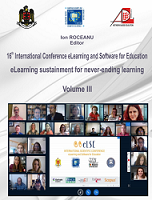LEARNING HEALTHY LIFESTYLE THROUGH SLEEPING BEHAVIOUR
LEARNING HEALTHY LIFESTYLE THROUGH SLEEPING BEHAVIOUR
Author(s): Irina Mocanu, Alexandru Placinta, Oana Cramariuc, Bogdan CramariucSubject(s): Health and medicine and law, ICT Information and Communications Technologies, Distance learning / e-learning
Published by: Carol I National Defence University Publishing House
Keywords: sleeping pattern; user profile; healthy lifestyle;
Summary/Abstract: Sleep represents a main factor for a healthy lifestyle. It improves health and quality of life in many ways: 1) it is vital for physical health; 2) it is essential for mental health; 3) improves memory and focus and 4) promotes personal and public safety. Sleep is a basic biological function that undergoes changes along with ageing and many pathological conditions. Some changes due to age are so deep that it is hard to distinguish between ageing and disease. Each person is different, considering the activities they perform that influence the sleep during the night, but also their metabolism, age etc. Different methods are therefore needed to explain the variation in sleep patterns for many people. Also, physical activity and sleep are highly interrelated health behaviours. The physical activity during the day influences the quality of sleep, and vice versa. The purpose of this paper is to present a system for creating a user profile based on his sleep behaviour. Based on the learnt profile, the system will automatically detect changes in the user's sleep pattern. If there are changes, the system will automatically check other medical parameters: heart rate, respiratory rate, physical activity during day (eg. number of steps). In case of existing abnormal values, an alarm message will be sent to the user with some suggestions regarding his daily programme. Data analysed is collected using two sensors: Emfit QS sensor for sleep monitoring and Fitbit for physical activity monitoring. In case of sleep, different machine learning methods were applied through pairs of sleep parameters (eg. duration in rem versus total sleep duration, duration in light versus total sleep duration, duration awake versus total sleep duration, activity versus toss and turns count) in order to learn the profile of the user. The learning method is based on regression models. The regression is performed on a variable number of days in order to find a model that will learn the data set. For each number of days used for training, the model score will be calculated on the following days, and in the end, the model that has managed to obtain the highest score will be chosen. The models used are simple linear regression, polynomial regression, regression trees and regression support vectors. The models were evaluated on data collected from three users. The data sets used for the evaluation of each user was collected over a period of six months. The following models have proven to be common to all users: the model that learns the correlation between the variation of sleep duration in the light stage versus the total sleep duration. Thus, the proposed system will be able to generate alerts or recommendations using his sleep pattern. In case of differences between his history, the user will receive information that will help him to correct his lifestyle. Through the learning profile of the user, the system will proactive supervise him, making possible to reduce the possibility of illness.
Journal: Conference proceedings of »eLearning and Software for Education« (eLSE)
- Issue Year: 16/2020
- Issue No: 03
- Page Range: 388-396
- Page Count: 9
- Language: English

